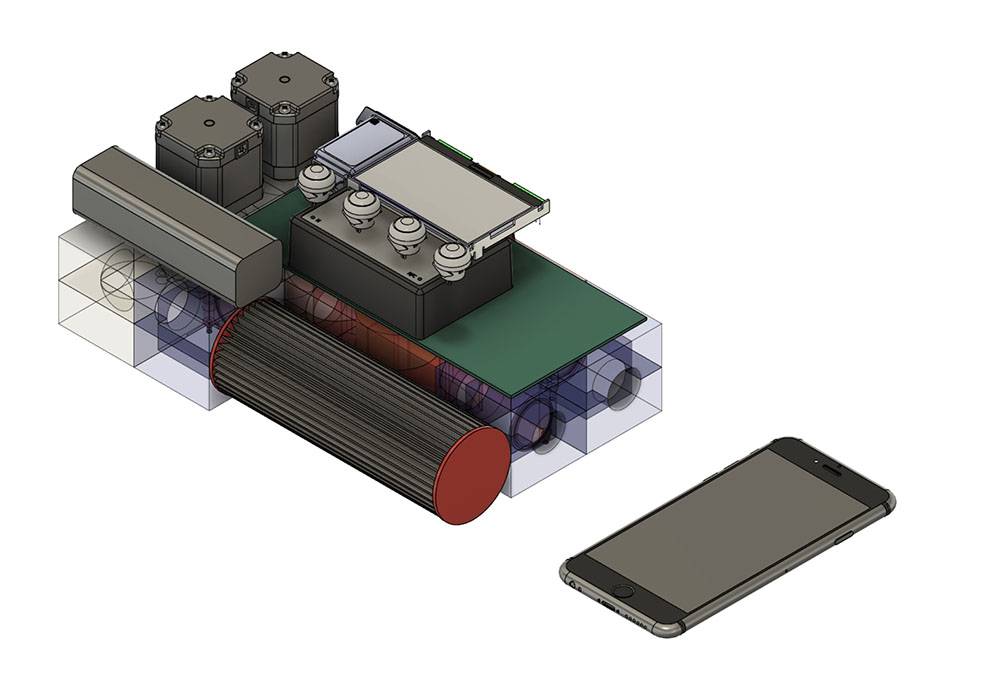Carnegie Mellon, Pitt Researchers Collaborate To Create Portable Ventilator Low-Cost 'RoboVent' Performs Well in Early Tests; Holds Promise for COVID-19 Patients
Byron Spice (CMU), Allison Hydzik (Pitt)Thursday, August 13, 2020Print this page.

A low-cost ventilator developed in the wake of the COVID-19 pandemic performed well in initial tests at the University of Pittsburgh School of Medicine, delivering air reliably to a simulated lung at pressures and volumes desired by clinicians.
The device, called the RoboVent, is being developed jointly by researchers at Carnegie Mellon University and Pitt.
"Our system is being built to cost less than $1,000, is easy-to-use and retains most of the functionality of a conventional intensive care unit ventilator," said Howie Choset, a professor in CMU's Robotics Institute. At the projected price, the RoboVent would be affordable for health systems in underserved communities and in low- and middle-income countries globally.
Unlike other low-cost ventilators, the RoboVent can also be used for different noninvasive ventilation modes that have become increasingly common in treating COVID-19 patients.
"The results of the test were pretty successful," said Dr. Jason Rose, a pulmonary and critical care physician and assistant professor of medicine and bioengineering at Pitt. "The initial study identified a few issues that will require further optimization," he added. More validation under different simulated medical conditions will be necessary before he and his fellow researchers will be ready to approach the U.S. Food and Drug Administration for emergency use authorization to use the RoboVent with patients.
"It was a good proof of concept," he added. "The RoboVent is already better than some emergency ventilators approved this spring when the COVID-19 pandemic peaked in states such as New York." Many emergency ventilators, he noted, lack some functionality and can be difficult to use.
Rose, together with Choset and Keith Cook, a CMU professor of biomedical engineering, launched the RoboVent project in March. U.S. hospitals were then bracing for an onslaught of COVID-19 patients that threatened to outstrip the supply of ventilators. Increased production of ventilators, changes in hospitalization rates and evolving patient-treatment strategies have eased the supply problem for now. But future surges in COVID-19 — combined with the onset of influenza season — could once again overwhelm health providers with demand.
Choset said the portable RoboVent includes a number of features that make it particularly attractive for coping with the COVID-19 pandemic and for developing countries looking to bolster hospital services for critically ill patients. The RoboVent includes robotic and sensor technology that can detect force as it drives an air pump, and includes air-management controls to create a closed-loop system.
The system can be adjusted remotely, so medical personnel need not enter a patient's room routinely, thus saving personal protective equipment and reducing risk to frontline healthcare workers.
Conventional ventilation requires inserting a tube into the patient's throat, but Rose said physicians increasingly treat COVID-19 patients with noninvasive alternatives — either high-flow oxygen through a nasal cannula or bilevel positive airway pressure (BiPAP) through a mask. The RoboVent can perform all those forms of ventilation, he added.
"This could really change the ventilator supply situation globally," Rose said.
The RoboVent has a modular design and can be built with parts that are readily available. In case of disruptions, alternative parts are widely accessible or can be easily made, Choset said.
"We have a manufacturing partner lined up who can possibly make 10,000 RoboVents to handle the next surge, but the machines will have uses beyond COVID-19, especially in low-income areas," he added.
Byron Spice | 412-268-9068 | bspice@cs.cmu.edu
